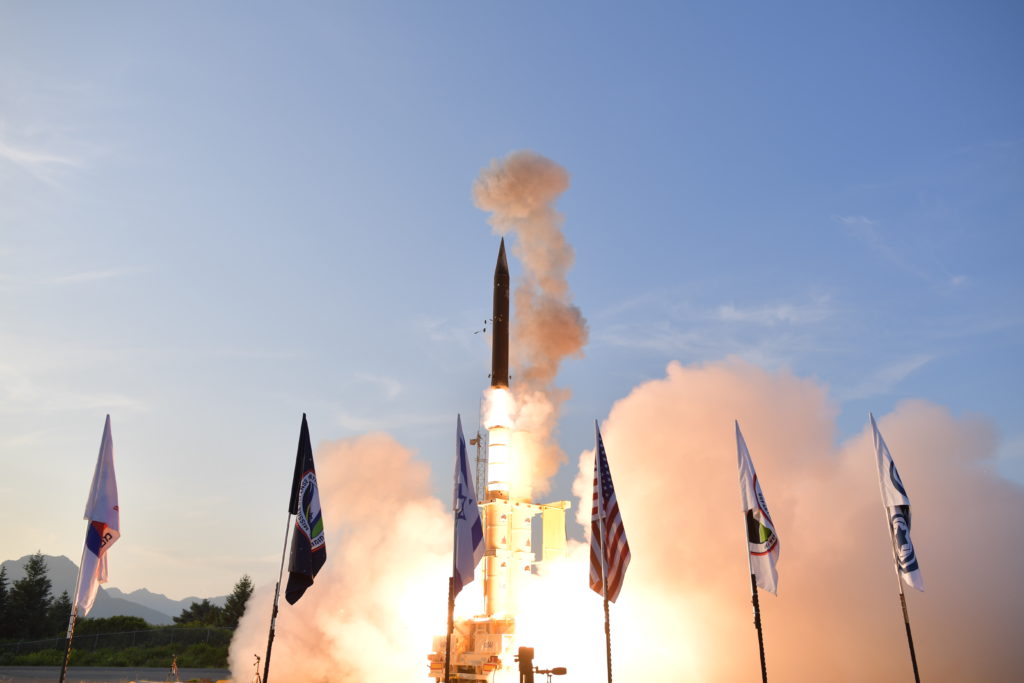
In response to an attack that killed three American soldiers, the United States on Friday struck more than 85 targets in Iraq and Syria used by Iran’s Islamic Revolutionary Guard Corps (IRGC) and affiliated militias to attack US forces. US Secretary of Defense Lloyd Austin warned “this is the start of our response”, according to a statement posted to the US Defense Department website. The retaliation comes as the US and United Kingdom continue to attack Yemen’s Iran-backed Houthi group that are threatening international shipping and Israel.
On Friday, that threat resurfaced for Israel, as the Israeli Arrow missile defense system shot down a surface-to-surface missile that “approached Israeli territory in the area of the Red Sea”— according to the IDF Twitter Feed. Yemen’s SABA news agency, affiliated with the Houthis, claimed credit for firing a “number of ballistic missiles” at Israel. Neither the IDF nor SABA reported any damage from the attack.
As Israel responds in Gaza to Hamas’ unprecedented terror massacre on October 7 that murdered 1,200 Israelis—mostly civilians—Iran and its proxies continue to broaden the conflict that now includes Lebanon, Syria, Iraq, Yemen, shipping in the Red Sea and US armed forces in the region. Israeli Defense Minister Yoav Gallant recently called for a global coalition to address the Iranian threat.
According to a summary of Gallant’s discussion with a delegation United Nations ambassadors on Thursday published by his office, Gallant “detailed Iran’s aggression against Israel via 7 different arenas. He stated that Israel is determined to act against any threat, while also highlighting the important role of the international community in countering Iran’s regional aggression.”
The US is acting in that role, with President Joe Biden calling for “additional actions to hold the IRGC and affiliated militias accountable for their attacks” on US and Coalition Forces, according to Austin’s statement. The initial series of US strikes killed at least 18 members of “Iranian militias” according to the Syrian Observatory for Human Rights. Austin said further retaliation “will unfold at times and places of our choosing. We do not seek conflict in the Middle East or anywhere else, but the President and I will not tolerate attacks on American forces.”
The American targeting of Iran-affiliated sites comes after a drone launched by an IRGC-backed militia killed three US soldiers stationed in Jordan on January 28, according to comments from Pentagon Press Secretary Sabrina Singh posted to the Defense Department website.
Meanwhile, the US and UK on Saturday hit 36 more Houthi targets in response to the Iran-backed group’s attacks on international shipping in the Red Sea. According to a statement on the US Defense Department website, the “precision strikes are intended to disrupt and degrade the capabilities that the Houthis use to threaten global trade, and the lives of innocent mariners, and are in response to a series of illegal, dangerous, and destabilizing Houthi actions.” The statement said the Houthi have launched more than 30 attacks at commercial and naval vessels since November.
Israel and the US have been in discussions on how to counter Iran’s aggression as the Islamic Republic strikes against both allies and the broader international community. Gallant and Austin conversed about “regional threats to US forces” in a call on Thursday, according to the Defense Department website. Similarly, an Israeli press release covering a January 25 visit to Washington, D.C. by Israeli Ministry of Defense Director General Maj.-Gen. Eyal Zamir said discussions with senior US government officials included talks “focused on countering Iranian aggression seeking to harm Israel and destabilize the Middle East.”
The current conflict began as an unprovoked attack against Israel by Hamas, but Iran was likely involved since the beginning and continues to stoke the flames to prevent the progress of peace in the Middle East. As Israeli President Isaac Herzog noted in a speech to the Knesset on January 24 published by Israel, “No one doubts that this House will hold very soon the most important and probably the most stormy discussions—on security… and also about our normalization processes in the Middle East, which Hamas, Hezbollah, the Houthis, and the head of the evil terrorism—Iran—are trying to thwart with all their might.”
(By Joshua Spurlock, www.themideastupdate.com, February 4, 2024)
